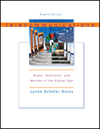
Laws and Regulations |  |
Chapter Summary| The telecommunications industry interrelates with all three branches of government—legislative, executive, and judicial—and with independent regulatory bodies. The main independent regulatory board overseeing electronic media is the FCC. Some of its chores are technical and have not changed much. Others, such as licensing, are more philosophical and are subject to changes as society's outlook alters. The areas of granting, renewing, and revoking licenses have caused broadcasters varying degrees of consternation throughout the years. Decisions regarding Brinkley, Shuler, WLBT, WHDH, and RKO affected the regulatory direction of the industry. Cross-ownership is an important topic at present. The FCC also has issued fines against obscenity, as in the Howard Stern case, and decided when equal time provisions were violated, as in cases regarding length of political commercials and presidential crisis speeches. On occasion, the FCC has issued guidelines or rulings such as the Blue Book.
The executive branch is most likely to claim clear and present danger if the president believes reporters are acting irresponsibly. The president can veto communication bills, as in the case of the fairness bill. In addition, the president nominates commissioners and can activate the Emergency Alert System. The Justice Department handles matters related to monopoly.
The legislative branch passes and amends many laws that affect telecommunications. The amendment to Section 315 that removed equal time restrictions from bona fide newscasts had a great effect on election campaigns. Other criminal and civil laws passed by Congress, such as those dealing with lotteries and copyrights, affect broadcasting, as do the state laws dealing with shield laws and invasion of privacy. Congressional committees hold hearings on communications-related issues, and the Senate approves the appointment of FCC commissioners.
The courts are the place of appeal for those who think they are treated unjustly by other branches of the government or by elements of society. Telecommunications and the courts have a double-edged interrelationship. On one hand, a battle was waged regarding the right of radio and TV to have access to the courts for news coverage—a battle that received a setback because of the O.J. Simpson case. On the other hand, the courts make many decisions that directly affect broadcasters, such as those involving the First Amendment. Indecency and obscenity rulings on subjects such as WBAI's “seven dirty words,” radio lyrics, and Internet transmissions were eventually decided in the courts, as were decisions regarding the FCC safe harbor policies. Likewise, libel cases, such as Westmoreland, and privacy invasions, such as ride-alongs, are fought in the courts. Some Section 315 decisions were appealed to the courts, such as the determination of when a campaign begins and who can sponsor presidential debates. The fairness doctrine kept the courts quite busy with cases that include Red Lion and cigarette advertisements. It was the courts that decided the FCC has the right to abolish the fairness doctrine. Although the various branches of government disagree with each other from time to time, equilibrium is maintained by the checks and balances system.
|
|
|